Source: BBC News (8/21/25)
‘He owed his life to those Chinese fisherman’: Dongji Rescue and the true story of a forgotten act of WW2 heroism
A new film dramatises the rescue during WW2 of hundreds of British POWs from the Lisbon Maru, a Japanese cargo liner. The story has not been widely recounted – until now.
By Emma Jones
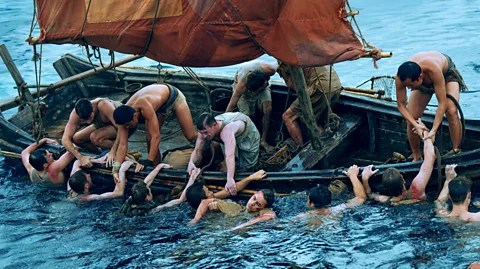
Trinity Cine Asia Still from Dongji Rescue (Credit: Trinity Cine Asia)
On 1 October 1942, a Japanese cargo liner, the Lisbon Maru, was being used to transport 1,816 British prisoners of war (POWs) to captivity in Japan. It was torpedoed off the coast of China by a US submarine, unaware that Allied prisoners were on board. According to survivors, the Japanese troops battened down the hatches of the hold before they evacuated the ship and left the British prisoners inside.
As the Lisbon Maru sank, the British mounted an escape, only to be fired at by the Japanese troops. Help arrived in the form of Chinese fishermen from the islands nearby, who rescued 384 men from the sea. These true events were the inspiration for first a documentary by Chinese film-maker Fang Li, The Sinking of the Lisbon Maru, released in China in 2024, and now a lavish Chinese blockbuster, Dongji Rescue.
The voice of Jack Hughieson from the Royal Navy describes, in an interview for the Imperial War Museum in London, how he heard doomed men still trapped inside the hold of the Lisbon Maru singing the wartime marching song, It’s A Long Way to Tipperary. “I can still hear it to this day,” he says. “Between the yells, the cries for help, was the singing. You could hear from the water… the cries of men going to meet their maker.”
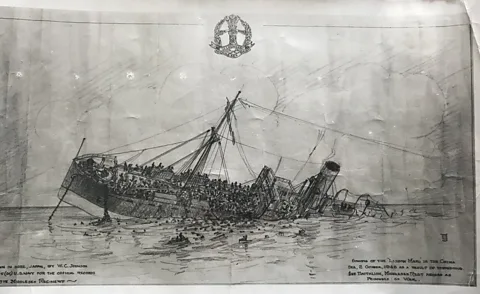
Laurel Films. The Japanese cargo liner the Lisbon Maru was torpedoed off the coast of China in 1942 by a US submarine (Credit: Laurel Films)
His is just one of the moving survivors’ testimonies Fang Li drew upon for The Sinking of the Lisbon Maru. He spent nearly a decade researching and making the documentary, based on a book by historian Tony Banham. As well as the oral histories, the director met families of the British POWs who died or survived the sinking, and found two survivors still living, nonagenarians William Beningfield and Dennis Morley. He also met the last surviving Chinese rescuer, Lin Agen, then aged 94 (all three men died before the film was released.)
Survivors’ accounts agree that the British troops, taken prisoner after the Battle of Hong Kong, were being held in filthy conditions in the holds of the Lisbon Maru, as Morley described it, “swimming in excreta, virtually”. When the ship was torpedoed and the British left imprisoned, one POW, a butcher by trade, who still had a knife, climbed up and cut the tarpaulin, giving some of them the opportunity to escape. They overpowered the guards left on board, only to be shot at by the Japanese military on nearby boats. “They were enjoying themselves,” Dennis Morley says in the film. “We were target practice.”
Their rescue came in the form of a fleet of Chinese fishing boats from the nearby islands on the Zhoushan Archipelago, who had realised that people were in the sea. These Chinese fishermen managed to pull the 384 British soldiers to safety, which prompted the Japanese to start rescuing men too, according to Major Brian Finch, a military historian and advisor to The Sinking of the Lisbon Maru, who has a producer’s credit on the film.
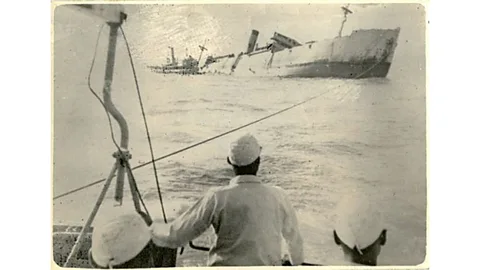
Laurel Films. Chinese fisherman rescued 384 of the 1,816 British troops that were being held as prisoners of war (Credit: Laurel Films)
“As the ship went down, sea water got into the boiler room, there was a huge explosion, and that drew the attention of the fishermen on the island,” Finch tells the BBC. “The explosion had thrown bales of cloth into the sea, and the islanders were an incredibly poor community. They rowed out for the cloth, but when they saw people floating around too, they started picking up people instead. This turned into a professional rescue operation. And there is no doubt, and this is testified by the survivors of the sinking, that once the Chinese fishing fleet appeared and could bear witness, the Japanese army stopped shooting and started picking up the survivors too. Dennis Morley was rescued by the Japanese, but he said he owed his life to those Chinese fishermen.”
Eight hundred and twenty-eight British servicemen died that day, but the rest were saved. This story, and the role their country played in their rescue, resonated with the Chinese public when the documentary was released there last year, and it made more than $6m at the box office, rare for a factual film. Now the action feature Dongji Rescue also hopes to capitalise on the interest.
‘A different viewpoint’
The lavish blockbuster, filmed in Imax and costing $80m to make, is co-directed by Guan Hu (who made 2024’s Cannes prizewinner Black Dog) and TV director Fei Zhen Xiang. It takes a different approach to the documentary. While it was filmed in the historical location of the sinking of the Lisbon Maru, with film sets built on Dongji island, nearly half the film was made underwater, and it weaves a fictional story, where the narrative centres on two heroic brothers (played by Wu Lei and Zhu Yilong) one of whom discovers and sets the British prisoners free, and a woman (Chinese actress Ni Ni) who leads the rescue party. None of this happened in reality.
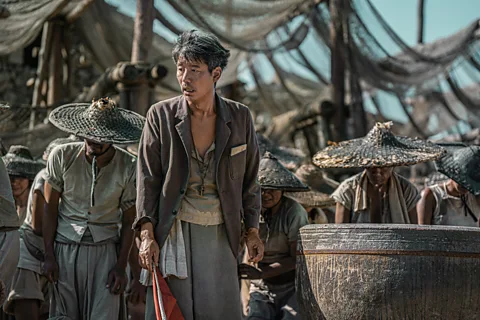
Trinity Filmed Entertainment Limited. Lavish Chinese blockbuster Dongji Rescue weaves a fictional story into the narrative of the Lisbon Maru sinking (Credit: Trinity Filmed Entertainment Limited)
“Some of the relatives [of the British troops] I’ve spoken to who saw the film said they were quite upset by the idea that the fishermen opened the hatches, and this was denigrating the courage and efforts of the prisoners themselves,” Finch says. The film also shows the islanders taking revenge against their brutal Japanese occupiers, something that Finch adds also “never happened, those islands weren’t occupied, although I do understand though that Japanese brutality would have been very real in those parts of China under occupation.”
Dongji Rescue has been praised by critics for its “gorgeous” visuals, but questioned by some as to whether it’s strayed too far from historical reality. John Berra in Screen Daily writes: “regardless of the technical craftsmanship on display, such embellishments diminish the fundamental power of a unique story”. But director Fei Zhen Xiang says the film simply offers a different viewpoint. “The documentary, while a very faithful retelling of the historical truth, focused on the recording of the history and on the British soldiers. We wanted to focus on the Chinese fishermen and their role, and so we had to show extra storylines and bring more events and emotions to the storytelling,” he tells the BBC.
Dongji Rescue also shows the British soldiers forming a troop and giving their rescuers a salute in thanks, which the director says was based on an anecdote from one of the fishermen. “We did eight years of research into the film, and interviewed the few fishermen were still alive. During the war, they suffered great poverty, but they gave the rescued soldiers food and clothing,” he says. “And I clearly remember that one of the interviewees mentioned that a British soldier saluted him, because he couldn’t thank him in Chinese. So, he showed him gratitude in a soldier’s way.”
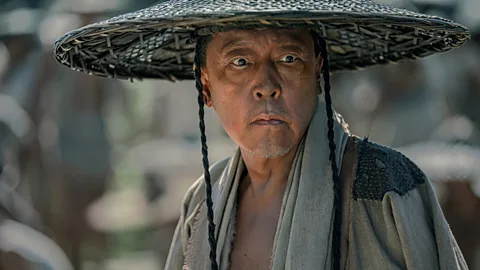
Trinity Filmed Entertainment Limited. Some have questioned whether the film Dongji Rescue has strayed too far from historical reality (Credit: Trinity Filmed Entertainment Limited)
Most of the British who survived the sinking were still taken as POWs to Japan (more than 700 would survive to VJ Day) but the story ends with one more astonishing twist – in the confusion, three British men, who spoke Chinese, were hidden in a sea cave on the island, and then spirited by resistance fighters through mainland China and then to freedom. “That really was an extraordinary act of courage on the part of the Chinese,” Brian Finch says.
He adds that the Lisbon Maru’s captain, Kyoda Shigeru, was sentenced to seven years’ imprisonment in 1946, but the Japanese Lieutenant in charge of the transport of the POWs, Wada Yoshio, died before he could be brought to trial. According to evidence from Captain Shigeru’s trial, he maintained that he had sought permission for everyone, including the British, to abandon ship, and that he “felt very sorry for causing trouble and hardship caused to the POWs”. Fang Li’s documentary meets his children, who describe a man for whom they say, “living was painful”.
The Lisbon Maru has never been raised, but a memorial to its sinking was unveiled in May 2025. Finch says the fact that it hasn’t been a well-known story might be due to the humility of the men on both sides. “I think when the British POWs from the Far East came home it was perhaps even a year after the end of the war, and they weren’t treated as heroes. And perhaps many of them didn’t want to talk about their experiences, they just wanted to get on with their lives,” he says.
“And although the actions of the Chinese fishermen were heroic, they were doing what fishing communities anywhere in the world would do. They’re aware of the dangers of the sea. If they see someone in the water, their first thought is to rescue them.”
Dongji Rescue is released in the US and UK on 22 August.
The Sinking of the Lisbon Maru is streaming in the UK on Odyssey Chinese Cinema to mark the 80th anniversary of VJ Day.